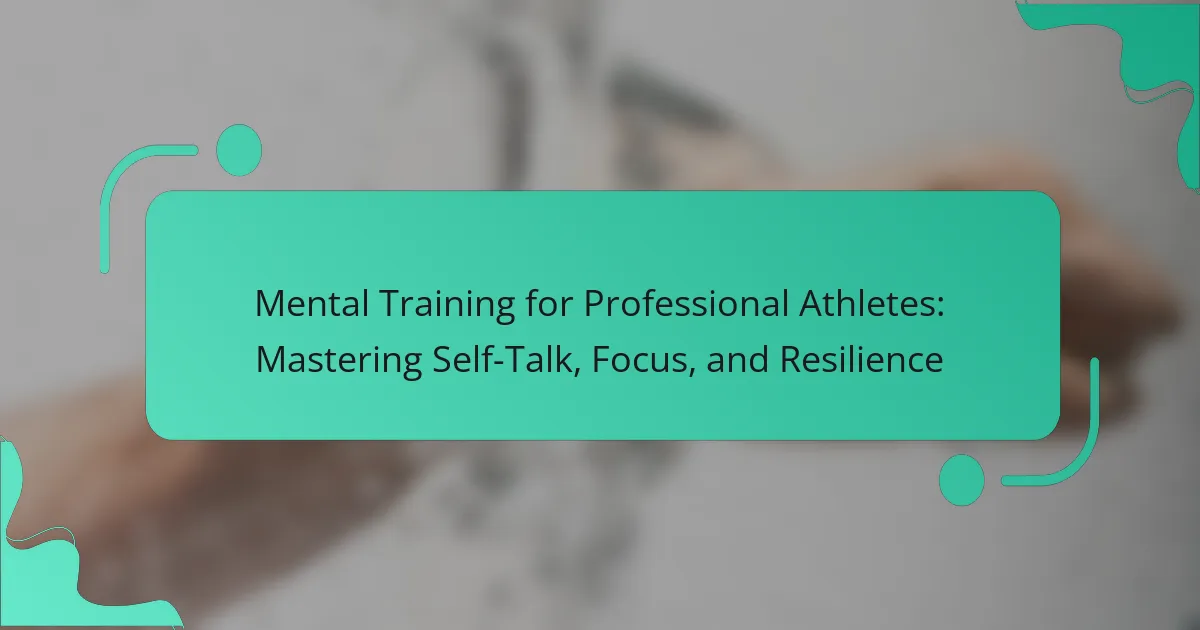Mental training is essential for professional athletes aiming to enhance performance and resilience. This article explores the impact of self-talk on focus and confidence, the benefits of mastering inner dialogue, effective techniques for enhancing self-talk, and common pitfalls to avoid. By understanding and applying these concepts, athletes can cultivate a stronger mental game and achieve consistent high-level performance.

How does self-talk influence performance in professional athletes?
Self-talk significantly influences performance in professional athletes by enhancing focus, boosting confidence, and fostering resilience. Positive self-talk encourages athletes to maintain a constructive mindset, especially during challenging moments. Research indicates that athletes who engage in positive self-affirmations experience improved performance metrics, such as faster reaction times and better decision-making abilities. Furthermore, self-talk can serve as a mental training tool, helping athletes visualize success and mitigate performance anxiety. By mastering self-talk, athletes can effectively harness their mental strength, leading to consistent high-level performance.
What are the different types of self-talk?
Self-talk can be categorized into three main types: positive self-talk, negative self-talk, and instructional self-talk. Positive self-talk involves encouraging and affirming statements that boost confidence. Negative self-talk includes critical and discouraging thoughts that can undermine performance. Instructional self-talk focuses on specific cues or strategies to enhance focus and execution during training or competition.
What role does positive self-talk play in athletic success?
Positive self-talk significantly enhances athletic success by boosting confidence and focus. Athletes who engage in constructive self-dialogue experience improved performance and resilience under pressure. Research indicates that positive affirmations can reduce anxiety and foster a growth mindset, essential for overcoming challenges. By consistently practicing positive self-talk, athletes develop a unique attribute of mental toughness, allowing them to maintain composure and motivation during competitions.
How can athletes cultivate positive self-talk?
Athletes can cultivate positive self-talk by practicing mindfulness, using affirmations, and reframing negative thoughts. Mindfulness helps athletes stay present and aware of their internal dialogue. Affirmations reinforce self-belief and confidence. Reframing allows athletes to view challenges as opportunities for growth, enhancing resilience and focus. Regular practice of these techniques can significantly improve mental training and overall performance.
What are the effects of negative self-talk on performance?
Negative self-talk significantly hinders performance by eroding confidence and focus. It can lead to increased anxiety, reduced motivation, and impaired decision-making. Athletes who engage in negative self-talk often experience a decline in their overall mental resilience. Research indicates that reframing negative thoughts into positive affirmations can enhance performance outcomes. For example, replacing “I can’t do this” with “I can improve” fosters a growth mindset, ultimately boosting performance.
How can athletes recognize and combat negative self-talk?
Athletes can recognize and combat negative self-talk by implementing awareness strategies and positive reframing techniques. First, they should identify specific negative thoughts that arise during training or competition. Keeping a journal can help track these thoughts and patterns. Next, athletes can replace negative self-talk with affirmations or motivational statements that reinforce their skills and capabilities. Practicing mindfulness can also enhance focus and reduce the impact of negative thoughts. Engaging in visualization techniques allows athletes to imagine successful performances, further countering negative self-talk. Regularly seeking support from coaches or sports psychologists can provide additional strategies tailored to individual needs.

What are the universal benefits of mastering inner dialogue?
Mastering inner dialogue offers universal benefits such as enhanced focus, improved resilience, and greater self-awareness. These attributes contribute to better performance in high-pressure situations. Athletes who refine their self-talk can manage stress effectively, leading to consistent and optimal performance. Research shows that positive self-talk can increase motivation and reduce anxiety, allowing athletes to maintain composure during competitions. Additionally, mastering inner dialogue fosters a growth mindset, encouraging athletes to embrace challenges and learn from setbacks.
How does improved focus enhance athletic performance?
Improved focus significantly enhances athletic performance by allowing athletes to concentrate on their training and competition. Enhanced focus leads to better decision-making, increased reaction times, and more effective execution of skills. Research indicates that athletes with strong mental training practices, including focus techniques, often outperform their peers. For example, elite athletes report a 20% increase in performance metrics when engaged in focused mental training routines. This unique attribute of mental resilience is critical for maintaining composure under pressure, ultimately resulting in improved outcomes in competitive scenarios.
What is the connection between resilience and self-talk?
Resilience and self-talk are closely connected; positive self-talk enhances resilience in athletes. Effective mental training fosters a mindset that helps athletes overcome challenges. Research shows that athletes who practice constructive self-dialogue exhibit greater emotional strength and adaptability. This unique attribute of self-talk significantly influences performance under pressure, reinforcing resilience.

What unique strategies can athletes use to enhance self-talk?
Athletes can enhance self-talk through visualization, affirmations, and mindfulness techniques. Visualization involves imagining successful performances, which reinforces positive self-talk. Affirmations are positive statements repeated to build confidence and counter negative thoughts. Mindfulness techniques help athletes focus on the present moment, reducing anxiety and improving self-awareness. These strategies cultivate a resilient mindset, crucial for peak performance.
How can visualization techniques complement self-talk?
Visualization techniques can enhance self-talk by reinforcing positive mental imagery, which boosts confidence and focus. Athletes can visualize successful performances, creating a mental framework that aligns with their self-talk. This synergy enhances resilience, enabling athletes to overcome challenges effectively. Visualization also aids in stress reduction, allowing for clearer, more constructive self-dialogue. By integrating these techniques, athletes can cultivate a powerful mental training regimen that optimizes performance.
What role does affirmations play in an athlete’s mental training?
Affirmations play a crucial role in an athlete’s mental training by enhancing self-talk, focus, and resilience. They help athletes cultivate a positive mindset, which is essential for peak performance. Regular use of affirmations can lead to improved confidence and reduced anxiety during competitions. Studies indicate that athletes who practice affirmations experience better emotional regulation and enhanced motivation. This unique attribute of affirmations contributes significantly to overall mental toughness, enabling athletes to overcome challenges and maintain focus under pressure.

What rare techniques can elevate self-talk practices?
To elevate self-talk practices, athletes can employ rare techniques such as visualization, cognitive restructuring, and mindfulness meditation. Visualization involves creating mental images of success to reinforce positive self-talk. Cognitive restructuring helps athletes challenge negative thoughts, replacing them with empowering affirmations. Mindfulness meditation enhances awareness, allowing athletes to observe their self-talk without judgment. Implementing these techniques can significantly improve focus and resilience in high-pressure situations.
How can mindfulness practices integrate with self-talk for athletes?
Mindfulness practices can enhance self-talk for athletes by fostering greater awareness and control over their inner dialogue. Integrating mindfulness allows athletes to recognize negative self-talk patterns and replace them with positive affirmations. This shift improves focus and resilience during competition. Research indicates that athletes who practice mindfulness report reduced anxiety and enhanced performance. By combining these techniques, athletes cultivate a supportive mental environment that promotes optimal performance.
What advanced cognitive techniques are effective for elite athletes?
Elite athletes benefit from advanced cognitive techniques such as visualization, mindfulness, and self-talk strategies. These methods enhance focus, promote resilience, and improve overall performance.
Visualization helps athletes mentally rehearse their performance, increasing confidence and reducing anxiety. Mindfulness techniques improve present-moment awareness, allowing athletes to manage stress and maintain concentration during competitions. Self-talk strategies foster a positive mindset, enabling athletes to overcome challenges and maintain motivation.
Incorporating these techniques into training regimens can lead to significant improvements in mental toughness and competitive edge. For example, athletes who regularly practice visualization report higher levels of self-efficacy and preparedness.

What are common mistakes athletes make with self-talk?
Athletes often make mistakes with self-talk by using negative language, focusing on outcomes rather than processes, and failing to practice consistently. These errors can undermine performance and hinder mental resilience. Negative self-talk can lead to decreased confidence and increased anxiety. Focusing solely on winning or losing distracts from the essential skills and strategies needed for improvement. Inconsistent practice of positive self-talk prevents athletes from developing a strong mental framework for competition.
How can athletes avoid self-sabotaging inner dialogue?
Athletes can avoid self-sabotaging inner dialogue by practicing positive self-talk and mindfulness techniques. Engaging in mental training exercises helps build resilience and focus. Techniques such as visualization and affirmations reinforce a positive mindset. Regularly reflecting on past successes can shift perspective and diminish negative thoughts.
What best practices should athletes adopt for effective self-talk?
Athletes should adopt positive self-talk, set specific goals, and visualize success for effective mental training. Positive affirmations enhance confidence and focus. Setting clear, attainable goals helps maintain motivation. Visualization techniques allow athletes to mentally rehearse performances, reinforcing self-belief. Regularly practicing these strategies fosters resilience and improves overall performance.
How can regular mental training sessions be structured?
Regular mental training sessions for professional athletes should be structured with clear objectives and a consistent routine. Sessions can include focused self-talk exercises, concentration drills, and resilience-building activities.
1. **Warm-Up (5-10 minutes)**: Begin with breathing exercises to enhance focus.
2. **Self-Talk Practice (10-15 minutes)**: Engage in positive affirmations and visualization techniques to boost confidence.
3. **Focus Drills (15-20 minutes)**: Implement concentration tasks, such as mindfulness meditation or attention exercises.
4. **Resilience Training (10-15 minutes)**: Use scenario-based challenges to develop coping strategies for setbacks.
5. **Cool Down (5-10 minutes)**: Reflect on the session, reinforcing positive outcomes and setting goals for future training.
This structure promotes mental clarity, emotional strength, and peak performance.
What expert insights can help athletes optimize their self-talk strategies?
Athletes can enhance their self-talk strategies by adopting positive affirmations, focusing on process-oriented thoughts, and practicing mindfulness. Positive affirmations boost confidence and reinforce a growth mindset. Focusing on process-oriented thoughts helps athletes concentrate on actions rather than outcomes, reducing anxiety. Mindfulness practices improve awareness of negative self-talk, enabling athletes to replace it with constructive dialogue. Research indicates that these strategies can lead to enhanced performance and resilience under pressure.
